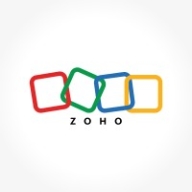

Oracle CRM and Zoho CRM compete in the CRM industry, with Oracle offering comprehensive integration capabilities, while Zoho focuses on ease of use and affordability. Oracle CRM may have the upper hand in large enterprise features, but Zoho CRM provides value for smaller setups with its simplicity and lower cost.
Features: Oracle CRM provides extensive integration capabilities with Oracle E-Business ERP, offers robust customization options, and includes real-time analytics tools. Zoho CRM, known for its user-friendly interface, offers effective lead and pipeline management, excellent reporting capabilities, and is highly customizable, especially valued by small to mid-sized businesses.
Room for Improvement: Oracle CRM should improve its usability and modernize its interface to compete with newer platforms. It faces performance challenges and integration issues with cutting-edge technologies. Cost-effectiveness and enhanced AI features are also suggested. Zoho CRM requires upgrades in its basic automation features, email campaign capabilities, and social media integration. Users often seek improved customer service response times and better scalability for larger enterprises.
Ease of Deployment and Customer Service: Oracle CRM offers flexible deployment options, including private, public, and hybrid clouds, though its support sometimes suffers from delays. Zoho CRM’s predominant cloud-based deployment is straightforward and works well for businesses of all sizes. Despite Zoho’s generally more user-friendly approach, its customer support has room for improvement regarding quick and efficient assistance.
Pricing and ROI: Oracle CRM is recognized as an expensive option, better suited to organizations with larger budgets, despite its potential long-term savings. Zoho CRM is notably more affordable, with flexible subscription models favored by startups and SMEs, often resulting in a quicker return on investment. Oracle provides comprehensive capabilities at a premium, while Zoho balances cost with competitive functionality.
Sometimes, they don't understand what my actual needs are.
The 1.5 deduction from 10 is due to cultural communication differences based on where we're getting the support, as sometimes it takes a couple of times to communicate clearly enough for them to understand the issue.
There are multiple blogs and articles available online for self-help.
The system is easy to understand, implement coding, and conduct training.
Zoho CRM is quite scalable; I have worked with clients who started with ten companies and have scaled up to managing 500 employees effectively within Zoho CRM.
The platform's global data centers across regions such as the US, EU, and India ensure data security and privacy through ISO certification and strong role-based security, which is essential for handling sensitive customer data.
We haven't really had any technical challenges with Oracle CRM.
Regarding the stability of Oracle CRM, nobody is facing any major issues in terms of infrastructure problems whether it is Oracle CRM, Salesforce, or SAP CRM; they are all the same, especially with cloud-based SaaS.
Zoho CRM guarantees 99% uptime, with downtime incidents being very rare.
I find Zoho CRM to be 100% stable and reliable as far as I know.
It is usually compliant with data regulation laws and is HIPAA compliant.
It's already integrated into our environment, so moving to something else will require a massive investment and change in strategy that we as an organization are not prepared to embark on just yet.
When a client asks for any support, they're often in real trouble and need a prompt response.
The AI feature needs improvement.
The platform does not save code versions similar to GitHub, where you can compare new versions with previous ones.
Some organizations may prefer not to have their data on the internet since Zoho CRM runs as a cloud service.
The main improvement needed for Zoho CRM is introducing SQL code for reports, similar to what's in Zoho Analytics.
Zoho CRM and all of Zoho's software are quite affordable because they are specifically designed for small and medium businesses.
In terms of my experience with the price and licensing cost, as with setup cost for Zoho CRM, it might not be quite affordable because there are cheaper solutions available.
The biggest advantage of Oracle CRM for me is the process coverage, ease of use, the UI, and obviously a good amount of analytics; these are the few strengths and seamless integration with any platform.
Currently it's meeting all our needs, hence the migration about six months ago that we moved from on-premise to OCI, to the cloud-based platform to add additional capacity and analytics.
The solution serves end-to-end customer relationship management which includes sales cloud, e-commerce cloud, and marketing cloud.
The most valuable aspect of CRMs, including Zoho CRM, Salesforce, and Microsoft Dynamics, is automation capabilities.
The most valuable feature I have found in Zoho CRM is custom functions. You can achieve anything with it. From integrations with other applications, it is instant.
You can customize everything—what you sell, be it products, services, or projects.
| Product | Market Share (%) |
|---|---|
| Zoho CRM | 1.6% |
| Oracle CRM | 1.1% |
| Other | 97.3% |

| Company Size | Count |
|---|---|
| Small Business | 17 |
| Midsize Enterprise | 2 |
| Large Enterprise | 22 |
| Company Size | Count |
|---|---|
| Small Business | 44 |
| Midsize Enterprise | 6 |
| Large Enterprise | 10 |
On demand CRM with contextual intelligence, adaptive business planning, and analytics. Supports cloud integration with Outlook and mobile devices, as well as sales and marketing applications. Multi-tenancy or single-tenancy options available.
Zoho CRM empowers organizations with a complete customer relationship lifecycle management solution for managing organization-wide Sales, Marketing, Customer Support & Service and Inventory Management.
We monitor all CRM reviews to prevent fraudulent reviews and keep review quality high. We do not post reviews by company employees or direct competitors. We validate each review for authenticity via cross-reference with LinkedIn, and personal follow-up with the reviewer when necessary.